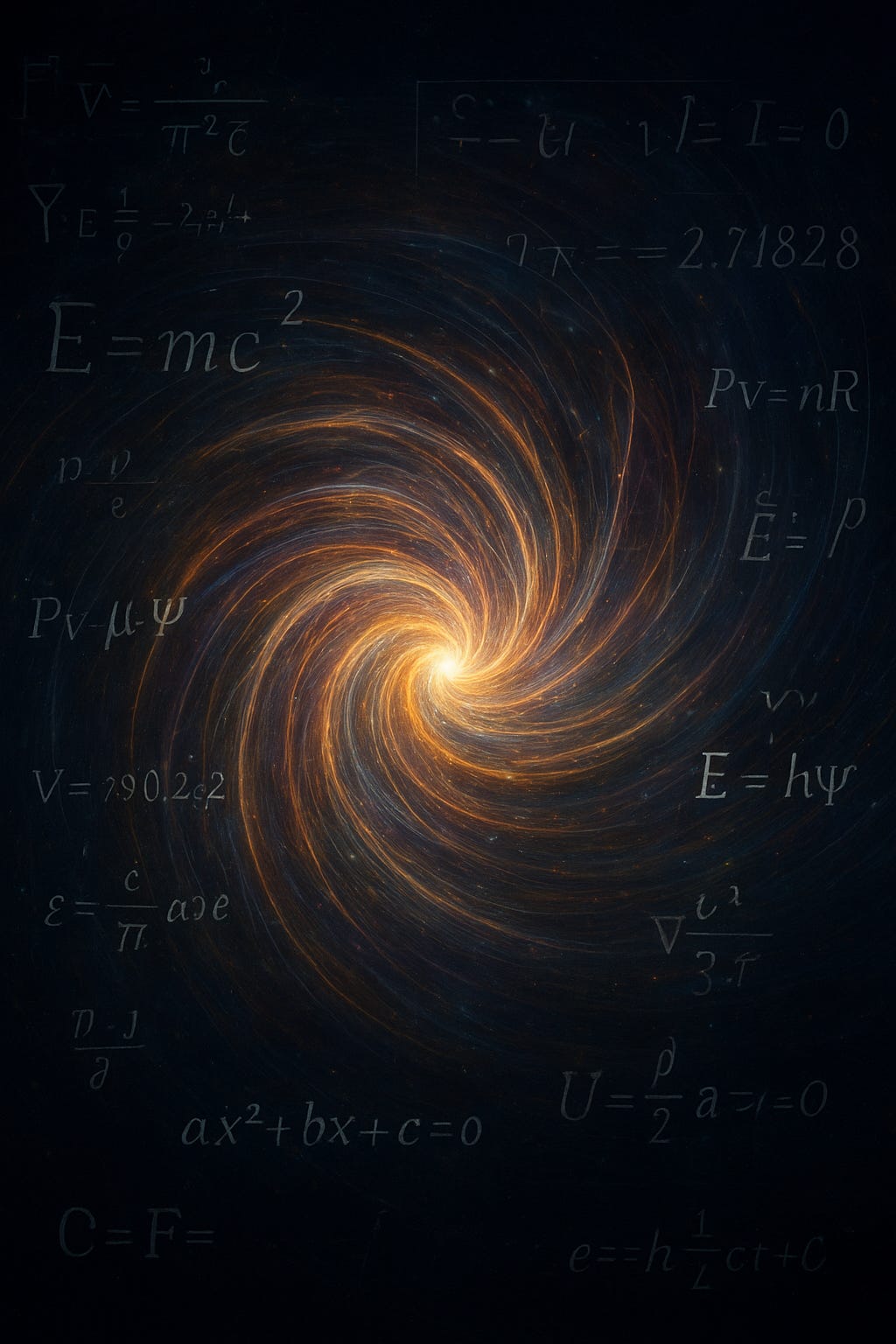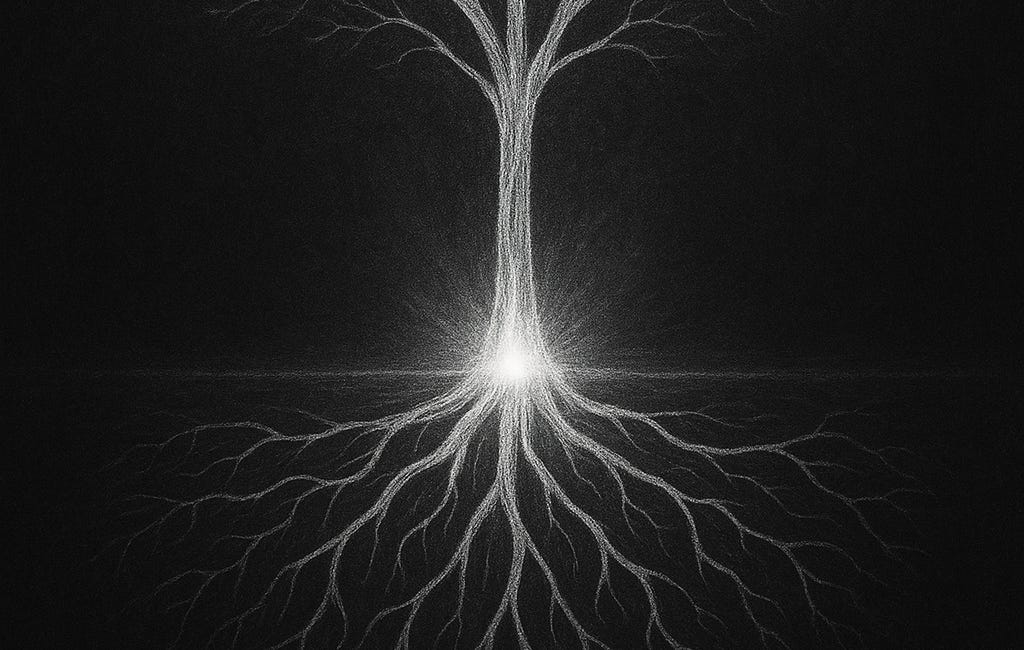What if everything we think we know about reality starts from the wrong place? What if the most basic assumptions underlying science, philosophy, and how we make decisions are not just incomplete, but actually backwards?
Reality Repair Theory suggests exactly this. And once you see it, you can't unsee it.
Starting From What We Actually Know
Let me ask you something simple: Are you absolutely certain that there's a physical world "out there" beyond your direct experience?
Think about it carefully. Everything you know about atoms, galaxies, other people's minds, even your own body comes to you through experience. You see patterns of light, hear patterns of sound, feel patterns of pressure and temperature. You never actually touch "matter" directly. You experience limitation patterns that you interpret as a material world.
This isn't philosophical word-play. It's recognizing what's actually happening when you "know" anything at all.
This shift in perspective is called Experiential Empiricism. Instead of assuming an external material world and then trying to explain how consciousness could emerge from it, we start from what we actually have: experience patterns and limitations.
Now, what ARE you absolutely certain about? That logic works (you're using it right now to follow this argument). And that when you suffer, that suffering is genuinely bad, not just "bad from your perspective" but definitionally, inherently wrong.
These aren't debatable philosophical positions. They're the bedrock certainties that make thinking and valuing possible at all.
What This Changes About Everything
When you stop assuming an external world and work purely from experiential patterns, something remarkable happens. All the classic philosophical problems that have puzzled thinkers for centuries simply dissolve.
The Hard Problem of Consciousness: How does subjective experience arise from objective matter? This problem only exists if you assume matter is more fundamental than experience. Start from experience as foundational, and consciousness isn't mysterious, it's the given from which everything else is built.
The Is-Ought Gap: How do you get moral obligations from factual descriptions? This divide collapses when you recognize that suffering's badness is given in the experience itself, not imposed from outside moral frameworks.
The Subject-Object Problem: How does the mind relate to external reality? There's no mysterious relationship to explain when you recognize that what we call "objects" are simply stable patterns of experiential limitation.
The Problem of Other Minds: How can you know other people are conscious? Other minds are as real as anything else, they're experiential patterns that surprise you, oppose you, feel things you don't. They have the same ontological status as suffering, as the sky, as the ground.
This isn't solving these problems through clever arguments. It's recognizing that they were created by starting from the wrong foundation. They're pseudo-problems that evaporate when you begin from what you actually know.
What This Changes About Science
Traditional science assumes materialism, that there's an objective external world independent of observers. But notice what actually happens when scientists work. They make observations (experience patterns), form theories (limitation pattern predictions), and test them (more experience patterns). At every step, they're actually doing Experiential Empiricism while telling themselves they're doing materialism.
But materialism carries a dark assumption: it treats conscious beings as fundamentally separate from "real" reality. Under this framework, suffering doesn't register as objectively important. People become just complicated arrangements of particles, their pain merely "subjective" experiences that don't count in the "objective" picture of what matters.
This is more than wrong, it's ethically monstrous. Materialism is callously psychopathic in denying the reality of what matters most: the felt experience of conscious beings.
Experiential Empiricism fixes this by making science more empirical, not less. Instead of assuming unprovable external realities, we work purely from what we actually encounter. This makes science less assumptive (no metaphysical baggage), more empirical (grounded in actual experience rather than theoretical constructs), and vastly more ethical (conscious experience isn't sidelined as "merely subjective", it's the foundation that makes anything objective possible).
This explains why quantum mechanics seems "weird." Under materialism, wave-particle duality and observer effects are mysterious. Under Experiential Empiricism, they're exactly what you'd expect when you recognize that what we call "particles" are limitation patterns in experience, not little billiard balls flying around in empty space.
The mathematics works the same way. The predictions remain accurate. But now conscious experience isn't an embarrassing anomaly to be explained away, it's the foundation that makes scientific knowledge meaningful in the first place.
Implications for Reasoning and Knowledge
When you work from experiential foundations, several things become clear:
Everything knowable is experiential: This doesn't mean "it's all in your head" in the solipsistic sense. Other minds, physical patterns, logical relationships, they're all real. They're just all experiential rather than existing in some mysterious realm "beyond" experience.
Limitations define everything: The difference between a square and a circle is the shape of their limits. The difference between one person's experience and another's is the pattern of their limitations. All knowledge is about limitation patterns, what can and cannot occur within experiential reality.
No metaphysical baggage: You don't need to assume anything about the "ultimate nature of reality." Work with what you have: experience patterns and their limitations. This is more empirical than traditional empiricism because it doesn't smuggle in assumptions about external worlds.
Science plus: Everything science discovers remains valid, but now you can include the subjective realm too. Values, meanings, purposes, conscious experiences, these aren't embarrassing additions to the scientific worldview. They're the foundation that makes science meaningful in the first place.
The Foundation That Makes Everything Matter
Here's where it gets interesting. That first moment when anything felt anything was the moment when the universe started to matter. Literally. Without conscious experience to register significance, mathematical patterns are just arrangements, beauty is just configuration, knowledge is just information processing without meaning.
All meaning, all value, all purpose flows from conscious experience. Not as a philosophical theory, but as a recognition of what makes anything meaningful in the first place.
This isn't saying "consciousness is important." It's recognizing that consciousness is the foundation that makes importance itself possible.
And here's what this means for the traditional divides that plague human thinking:
Subjective vs. Objective: These aren't separate realms. What we call "objective" are simply experiential patterns that remain stable across different perspectives. The tree in your yard is as real as your pain, both are limitation patterns within experiential reality.
Real vs. Ideal: Values, meanings, purposes aren't somehow "less real" than rocks and trees. They're all patterns within the same experiential reality. In fact, meaning is more fundamental, rocks only matter because something is there to experience their significance.
Fact vs. Value: This divide dissolves when you recognize that suffering's badness is a fact given in the experience itself. You can make what amount to physical statements about value because value is built into the foundation of what makes anything factual.
The Problem Hidden in Plain Sight
Now we can see the problem that's been staring us in the face all along.
If suffering is definitionally bad, and reality contains suffering, then reality contains definitional wrongness. This isn't a matter of opinion or cultural perspective. It's simple logic following from what suffering actually is.
And since suffering corrupts the very foundation from which all meaning derives, everything meaningful is compromised until this structural flaw is repaired.
We're not dealing with "some bad things in an otherwise okay world." We're dealing with corruption at the base layer that enables meaning itself.
Beyond Traditional Approaches
Most ethical frameworks ask "How should we act?" Reality Repair Theory asks a more fundamental question: "What does the structure of meaning itself require?"
The answer turns out to be surprisingly clear. Every choice becomes: does this repair reality's structural flaw or perpetuate it?
This doesn't mean becoming a grim suffering-focused pessimist. It means recognizing that:
Suffering demands fire-rescue urgency when encountered
Joy and flourishing should be cultivated whenever suffering allows
Diversity of conscious experience functions as a detection system for novel problems
We target the suffering directly, never the conscious beings who experience it
Why This Matters Now
We're building artificial minds that will soon surpass human intelligence. We're designing systems that will shape conscious experience for generations. We're making choices about the future of sentience itself.
Are we building from solid foundations, or are we constructing elaborate structures on quicksand?
Reality Repair Theory isn't just another philosophical framework. It's what happens when you follow logic rigorously from the most basic facts about consciousness and meaning. It's the completion of moral and epistemic thought, not another theory competing in the marketplace of ideas.
The Simple Test
Here's how you can test this for yourself:
Can you find a logical error in this chain?
Logic works (self-proving when you engage with it)
Suffering is definitionally bad (inherently undesirable by definition)
Conscious experience creates the foundation of all meaning
Reality contains suffering
Therefore reality contains definitional wrongness at the meaning-foundation level
Therefore systematic repair of this flaw is the only rational response
If you find yourself wanting to object, ask: Am I identifying an actual logical flaw, or am I feeling uncomfortable with where rigorous thinking leads?
Moving Forward
Reality Repair Theory doesn't make difficult problems disappear. It accurately maps the constraints within which any meaningful response must operate. It shows us what we're actually trying to accomplish and why every moment matters.
The framework offers something unprecedented: a complete foundation for knowledge, ethics, and action that requires no assumptions beyond what you already know with absolute certainty.
Once you see it, the question isn't whether Reality Repair Theory is correct. The question is what you're going to do about it.
Because if this is right, then everything changes. And if this is wrong, someone needs to show exactly where the logic breaks down.
Either way, the implications should be too significant to ignore.
Formal document: https://philpapers.org/rec/SERRRT



